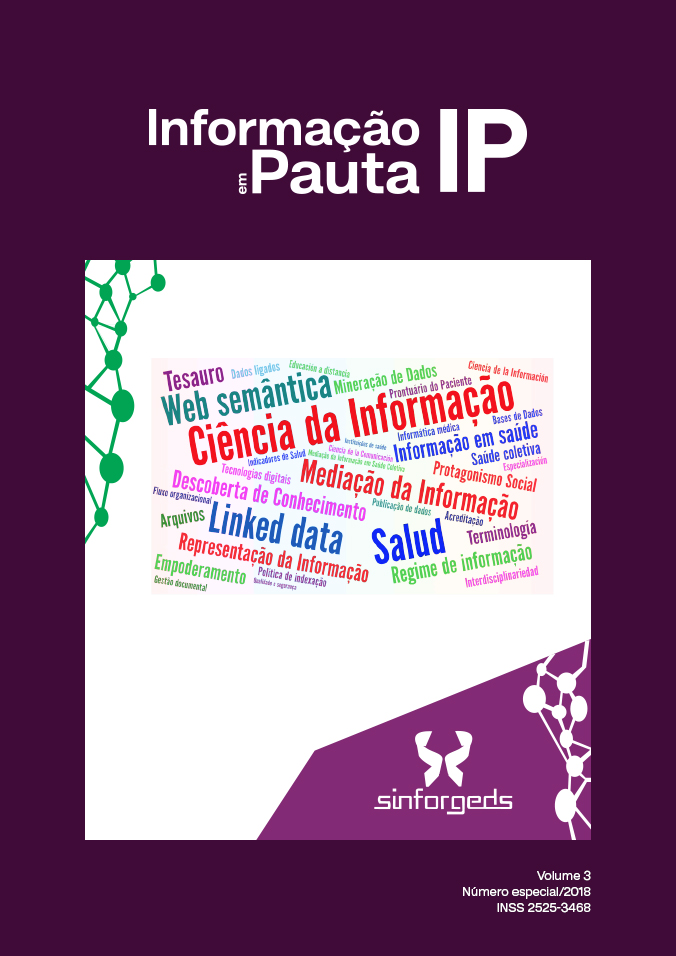SEMANTIC WEB: flow for publishing open and linked data
DOI:
https://doi.org/10.32810/2525-3468.ip.v3iEspecial.2018.39721.117-140Keywords:
Linked data, Semantic web, Data publishing, Connect data, Organizational FlowAbstract
Publishing open and semantic data has become a major challenge for organizations around the world. There is a wide variety of actions that must be performed before a data publishing project can be completed. The main objective of this research is to present a phase-oriented organizational flow proposal that describes the activities that should be developed in the process of publication of data in an open and semantic format following the best practices of linked data. The methodology used is based on descriptive and analytical research, based on documentary analysis. As a result, it is expected that the presented flow can contribute to the development of new projects of publication of data in open and semantic format.Downloads
References
BERNERS-LEE T.; LASSILA, O.; HENDLER, J. The semantic web. Scientific American, New York, v. 5, 2001.
BERNERS-LEE, T. Linked data principles. 2006. Disponível em: <https://bit.ly/1x6N7XI>. Acesso em: 09 jun. 2018.
BORKO, Harold. Information science: what is it? American Documentation, [S.l.], v. 19, n. 1, p. 3-5, 1968. Disponível em: <https://bit.ly/2DLQfkL>. Acesso em: 10 jul. 2018. DOI: http://doi.org/d9zjg3.
EAVES, D. The Three laws of open government data. 2009. Disponível em: <https://bit.ly/2ftyZUW>. Acesso em: 10 jul. 2018.
GUIMARÃES, J. A. C. Perspectivas de ensino e pesquisa em organização do conhecimento em cursos de Biblioteconomia do Mercosul: uma reflexão. In: ENCUENTRO DE INVESTIGADORES DE BIBLIOTECOLOGIA Y CIENCIA DE LA INFORMACIÓN DE IBEROAMERICA Y EL CARIBE, 5., 2000, Granada. Anais...Granada: EDIBCIC, 2000.
HEY, T. et al. (Org.). The Fourth Paradigm: Data-Intensive Scientific Discovery. Redmond, Washington: Microsoft Research, 2009. Disponível em: <https://bit.ly/1iD63DJ>. Acesso em: 10 ago. 2018.
LÓSCIO, B. F.; BURLE, C.; CALEGARI, N. Data on the Web Best Practices: challenges and benefits. W3C Recommendation, 2017. Disponível em: <https://bit.ly/2FG1EoK>. Acesso em: 10 jun. 2018.
MANUAL dos dados abertos: desenvolvedores. Cooperação técnica científica entre Laboratório Brasileiro de Cultura Digital e o Núcleo de Informação e Coordenação do Ponto BR (NIC.br). São Paulo: Comitê Gestor da Internet no Brasil, 2011. Disponível em: <https://bit.ly/2Ai8oTB>. Acesso em: 10 abr. 2018.
MELO, J. O. S.; BOTEGA, L. C.; SANTAREM SEGUNDO, J. E. Metodologia de avaliação de qualidade para dados conectados. In: ENCONTRO NACIONAL DE PESQUISA EM CIÊNCIA DA INFORMAÇÃO, 18., 2017, Marília. Anais... Marília Unesp: ANCIB, 2017.
OPEN KNOWLEDGE FOUNDATION. About OKF. 2004. Disponível em: <http://okfn.org/about/>. Acesso em: 25 ago. 2018.
SANTARÉM SEGUNDO, J. E. Web Semântica, dados ligados e dados abertos: uma visão dos desafios do Brasil frente as iniciativas internacionais. Tendências da Pesquisa Brasileira em Ciência da Informação, João Pessoa, v. 8, p. 219–239, 2015.
SANTARÉM SEGUNDO, J. E; CONEGLIAN, C. S. Web Semântica e Ontologias: um estudo sobre construção de axiomas e uso de inferências. Informação & Informação, Londrina, v. 21, n. 2, p. 217–244, dez. 2016. Disponível em: <https://bit.ly/2uLpbgL>. Acesso em: 09 jun. 2018.
SARACEVIC, Tefko. Ciência da informação: origem, evolução e relações. Perspectivas em Ciência da Informação. Belo Horizonte, v. 1, n. 1, p. 41-62, jan./jun. 1996.
SAYÃO, L. S. F.; SALES, L. F. Digital curation: a new platform for digital preservation of research data. Informação & Sociedade: Estudos, Paraíba, v. 22, n. 3, 2012. Disponível em: <https://bit.ly/2KLvOIq>. Acesso em: 09 set. 2018.
Published
How to Cite
Issue
Section
License
Autores que publicam nesta revista concordam com os seguintes termos:
a. Autores mantém os direitos autorais e concedem à revista o direito de primeira publicação, com o trabalho simultaneamente licenciado sob a Creative Commons Attribution License que permitindo o compartilhamento do trabalho com reconhecimento da autoria do trabalho e publicação inicial nesta revista.
b. Autores têm autorização para assumir contratos adicionais separadamente, para distribuição não-exclusiva da versão do trabalho publicada nesta revista (ex.: publicar em repositório institucional ou como capítulo de livro), com reconhecimento de autoria e publicação inicial nesta revista.
c. Autores têm permissão e são estimulados a publicar e distribuir seu trabalho online (ex.: em repositórios institucionais ou na sua página pessoal) a qualquer ponto antes ou durante o processo editorial, já que isso pode gerar alterações produtivas, bem como aumentar o impacto e a citação do trabalho publicado.



